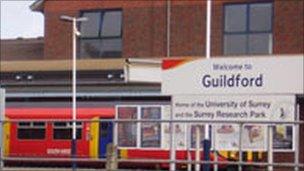Surrey resilient to economic shocks, research finds
- Published

Surrey boasts a high proportion of businesses in high-growth sectors, the research suggests
Large parts of Surrey are well-equipped to weather future economic storms, BBC-commissioned research suggests.
The study, carried out by Experian, ranks the resilience of council areas in England to economic shocks.
It found Elmbridge to be the most resilient area in the country, with Waverley, Mole Valley and Surrey Heath all featuring in the top 10.
Surrey Unison said the results masked "extreme" pockets of deprivation in the county.
The government will announce its spending review results in the autumn.
The researchers looked at data for 324 district and unitary authorities across four broad areas - business, people, place and community.
The study does not predict where cuts will fall but suggests the local authority areas which may have the best chance of a quick recovery.
Waverley enjoys high business density and high self-employment rates as well as a high proportion of businesses in high growth sectors, the report said.
Elsewhere, Woking has the 4th highest proportion of high-growth sectors of anywhere in England, while Runnymede has the 8th highest number of firms which export.
In Elmbridge, residents have high life expectancy, a low number of people claiming benefits and low long-term unemployment.
Chris Leary, a spokesman for Surrey County Unison, said: "Surrey gives an overall impression that the county will be quite resilient for the forthcoming cuts, but this is heavily skewed by the extreme wealth that exists in parts of Surrey.
"This masks the hidden pockets of extreme deprivation and poverty that exist within Surrey, especially in the north of the county, such as areas like Spelthorne which is 80th on this list."
The economy will be debated on BBC Radio Surrey at 0900 BST on Friday.